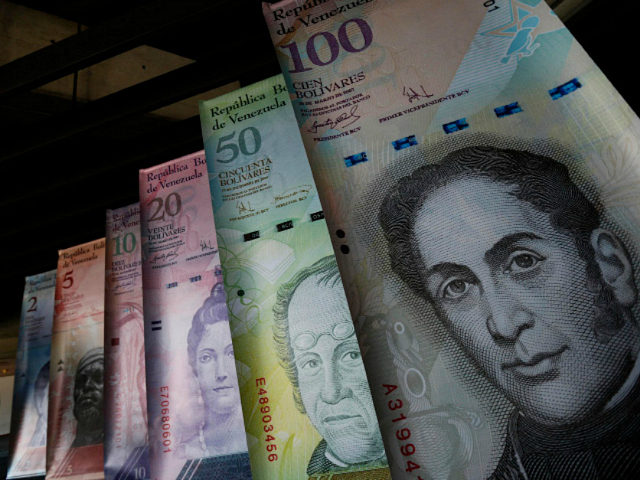The government of Venezuela has little over $10 billion of foreign reserves cash, CNN reports, suggesting it will soon run out of funds completely. The nation’s socialist government has vowed not to default on its debts but has done little to stop the rapidly growing hyperinflation and spread of poverty and hunger.
With $10.5 billion in its coffers, Venezuela is expected to pay $7.2 billion to nations it owes debt payments to, leaving very little in the bank. CNN notes that Venezuela’s foreign reserves have been in rapid decline for years — Venezuela boasted nearly twice the amount of money in 2015 and $30 billion just six years ago. “The trend can’t persist much longer,” CNN warns, “but it’s hard to know exactly when Venezuela will run completely out of cash.”
“There are now individuals in South America that have more money than Venezuela’s central bank,” Kenneth Rapoza observes in Forbes. “Venezuela’s economy is contracted an impressive 18.6% in 2016. If there is a failed state in the America’s, [Venezuelan dictator Nicolás] Maduro is running it.”
Venezuela’s next debt payment is due April 12, according to the Venezuelan newspaper El Nacional. The government must pay $2.1 billion, inching it ever closer to default. According to economist Tamara Herrera, who spoke to a regional outlet, the government has vowed to avoid default because “it would be devastating for the country, but even more for the government.” She nonetheless warns that a “disorderly default” could be on the horizon due to the government’s proven inability to manage the economy.
Venezuela’s economy has been socialist for 17 years since late dictator Hugo Chávez assumed power and began nationalizing private businesses and scaring away foreign investors. Chávez could afford to do so largely due to high crude oil prices — Venezuela boasts the world’s largest oil reserves — though even under his rule, Venezuelan businesses were devastated by government intervention. Under his successor, Nicolás Maduro, oil prices have fallen, expropriation of businesses has become more common, and the economy is spiraling into hyperinflation.
Businesses that the government has not shut down directly are closing their doors in droves. Reuters reports this week that experts estimate Venezuela has lost nearly one million private sector jobs in the past year and a half. The government has refused to release unemployment statistics for nearly a year, so outlets like Reuters must depend on independent research institutes for estimates.
The economy has been so devastated that experts believe it will take between eight and fifteen years to see any major signs of recovery. Citing the nation’s “exceptional ruin,” Harvard economist Miguel Ángel Santos told El Nacional that Venezuela’s economic devastation is comparable only to the immediate post-Soviet Cuban economy in Latin America. “We have to grow in a different way than what we have been doing for over 20 years,” he suggested, adding that the Venezuelan exile community abroad will benefit Venezuela greatly, helping rebuild when the nation is once again free.
The largest Venezuelan diaspora community is in the United States. Venezuelan-Americans are more likely than the average American of any background to have attained some college education, and seven in ten Venezuelan-Americans speak English fluently, according to the Pew Research Center.
The Venezuelan government continues to blame an “economic war” waged by the United States for its dire financial situation. This past week, Foreign Minister Delcy Rodríguez asserted that “multilateral aggressions against the Venezuelan economy” were to blame for the hyperinflation and mass poverty during the Socialist Party’s tenure. Maduro himself has used the term “economic war” repeatedly, citing multiple sanctions against his officials for, among other crimes, participation in international drug trafficking operations.
When not blaming the United States for the economic problems, Maduro is working to exacerbate them. In January, Maduro announced a 50 percent increase in the minimum wage nationally — bringing the current rate to $12.14 monthly — as an attempt to “protect [workers] from the onslaught of the beastly economic war leveled onto the country for many years.”

COMMENTS
Please let us know if you're having issues with commenting.